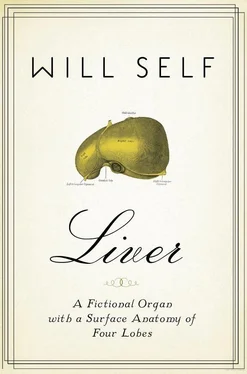‘He will take you for supper at Casa Ferlin after the concert,’ Marianne said. By this alone Joyce understood that she was not the first other woman to be so entertained, and nor would she be the last. ‘Be making sure to have baby cow meat — the veal?’
‘The veal,’ Joyce concurred.
‘It was the dinners for the Umzug last night — Ueli was with his Schneider Zunft until late times. He was ve-ery drunk.’ She laughed.
‘ Schneider?’
‘The men who do the’ — she mimed sewing — ‘making of clothes.’
‘Tailors? I had no idea Ueli was a tailor, I understood he owned a Mercedes dealership.’
Erich cavorted over to his father, who was chatting with his fellow Schneiders ; from a hundred feet away their hungover hilarity was still salient: shoulders shook, banners quivered. Erich fitted in, Joyce thought; his country squire’s costume was more mummery. St Vitus was Erich’s patron — he zigged and zagged and boogied beside his dad, who, together with his friends, seemed oblivious.
Marianne laughed again, sourly. ‘Aha, no, you see this is only the guild for the ceremony — they are not real tailors.’
Any more than this was the medieval era, with an abbess installed in the abbey church, although, as the big bells of the Fraumünster began to two-tone toll ‘Bing- bong , bing- bong , bing- bong ’, a local government official in fancy dress stepped forward and fiddled with a lighter, until the brand he held licked into life. The tots in baseball caps cried out, as worshipful of fire as anyone, ever. The brand sent flames hopping and skipping up the flanks of the pyre. It was, Joyce judged, a cleverly constructed and very Swiss pyre: a giant inverted fir cone of precisely stacked logs. The B 
 gg himself, far from being a grotesque Guy, was an elegant wooden bodyform that would have sat well in the Kunsthaus. One of the vanquished Winter Spirit’s arms was raised, and as the two women watched this was slit by fire and puffed yellow smoke.
gg himself, far from being a grotesque Guy, was an elegant wooden bodyform that would have sat well in the Kunsthaus. One of the vanquished Winter Spirit’s arms was raised, and as the two women watched this was slit by fire and puffed yellow smoke.
‘I hear nothing now from Father Grappelli,’ Joyce said. ‘Now Monsignor Reiter has returned to Rome, it’s as if I. well, don’t exist.’ She fell silent, appalled by her own self-piteous tone. The B 
 gg was swaying in a fiery soutane, then the first of the fireworks packed into the effigy’s shapely chest shot up through the linden boughs and arced over the river. ‘I mean,’ she resumed, ‘what’s happening with the political side of things — this business of a referendum? Father Grappelli seemed to think it would be easy to get the necessary signatures — fifty thousand, is it?’
gg was swaying in a fiery soutane, then the first of the fireworks packed into the effigy’s shapely chest shot up through the linden boughs and arced over the river. ‘I mean,’ she resumed, ‘what’s happening with the political side of things — this business of a referendum? Father Grappelli seemed to think it would be easy to get the necessary signatures — fifty thousand, is it?’
Again the tightened face and the acerbic laugh; whatever creaminess Marianne Kreutzer had exuded in Baden had now gone off. ‘You — you, well you are not understanding, Joyce. The referendums — no one is giving their votes. No one cares, you see. No one cares.’
More rockets launched from the burning manikin, as the crowd sighed with pleasure; a flight of pigeons lifted off from the Badean-stalt — the open-air swimming pool out in the river. The B 
 gg half crumpled, embers bleeding from his cracked ribs. It was a creepily human motion — as if the figure were a suicidal monk, who had doused himself in petrol, then sparked a match.
gg half crumpled, embers bleeding from his cracked ribs. It was a creepily human motion — as if the figure were a suicidal monk, who had doused himself in petrol, then sparked a match.
Marianne Kreutzer urbanely lit a mentholated cigarette. ‘I was, you know, twenty-one when the Federal Constitution was changed to make the women do the voting — to give me the vote. By then. well, I was making my money already three years. There are some cantons — Appenzell Innerrhoden — where there was no women voting until 1990.’ She took a pull on the cigarette and exhaled; her expression said it had lost its minty savour. She dropped it and ground it out with a patent leather toe; then she picked up the butt and clicked to a steel bin, where she discarded it. By the time she returned to Joyce’s side, the B 
 gg was no longer humanoid — was no longer anything, and the Sechsel äu ten was only another bonfire.
gg was no longer humanoid — was no longer anything, and the Sechsel äu ten was only another bonfire.
‘The churches, the state, the banks also — in Switzerland, Joyce, to have any of these — these Grossfirmen . ’ She cast about, almost wildly, having reached the limits of her English.
‘Do you mean institutions?’
‘Exactly so. To have any of these big institutions pay any attention to a woman — an older woman — well, this is, I think, also the miracle.’
In the interval Joyce followed Ueli Weiss to the circle bar, where, on a shelf supported by two gold-painted plaster cherubs, two gin and tonics were waiting for them. He used the paper napkin with his surname written on it to blow his nose and wipe his moustache, then he began an explanation. This was not the usual venue for this festival concert: it was normally held in the Grosser Saal of the Tonhalle; but then nor was it the custom to have a visiting orchestra playing — in this case, the San Francisco Symphony.
Joyce only half listened to his lecture on Zürich’s musical politics; she sensed that Weiss was giving it not because he thought it of interest to either of them but simply to fill time: a verbal intermezzo.
Other couples, the vast majority in late middle or old age, stood having their drinks. The wealthy and cultured Zürichers were dressed in their habitual navy blues and shades of black — with, here and there, a youngster in her fifties who dared brown. Jewels sparkled at plump wrists and plumper throats; these women’s bodies were display cushions , scattered in this gilded cabinet.
The programme, thus far, had not entranced Joyce. Her thoughts had not been about music — or music itself resounding in her mind, note-for-thought, tone-for-feeling, the organic development of mood — but preoccupied with how very un-musiced she felt. The musicians had clodhopped on to the steeply raked stage, frumpy cellists and tubby percussionists, their evening dress worn as love-lessly as traffic wardens’ uniforms. Had they been this apathetic when they left the City of Industry, or had the pall fallen on them only as their flight descended into Zürich?
And there, in the shape of the local conductor, had been the cliché Joyce dreaded: he was a Francophone Swiss from the hinterland of Geneva, who was yet more Bavarian than a puppet in wooden lederhosen strutting from underneath a clockface. Tick-tock, tick-tock — he gestured from the waist, and hearkening to his Taylorization of sound, the assembled lines of players sawed and hammered and blew. The opening chords of the Overture Egmont, which should have been a Romantic storm surge, were instead a mechanical pumping out of sound.
As the San Franciscans laboured to the Swiss beat, Joyce despaired. There was no dizzying ascent into the orbit of the crystalline chandelier that dripped from the ceiling of the auditorium; instead, she was sent truffling between ankles, where she smelt the shit of toy poodles smeared on expensive shoes.
Back in Birmingham, back in time, on those rare occasions when she had thrust Derry before her to a concert — it wasn’t that he was crass, or that he couldn’t swing to a slower beat, only that he preferred his Laphroaig to hand, and to be able to turn up the volume when Dexter blew hot and mean — Joyce, not liking herself for it, would involuntarily cast her eyes to one side, again and again, gauging his response to what they heard and then, sickeningly, adjusting her own.
Читать дальше













